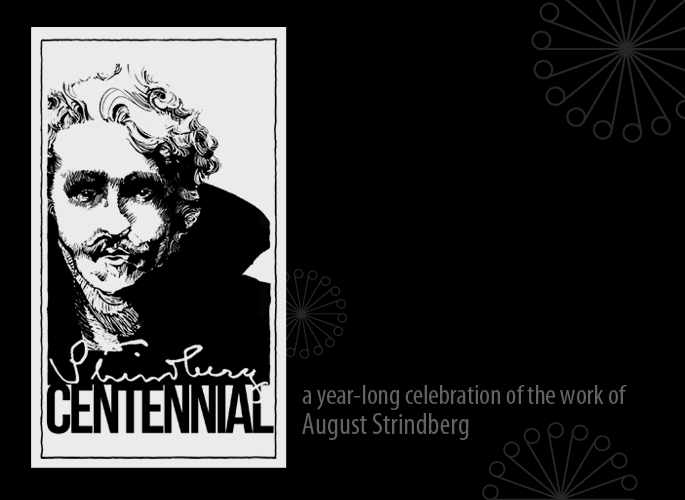CHAMBER MUSIC
Strindberg Cycle: The Chamber Plays in Rep
By August Strindberg
The Cutting Ball Theater
San Francisco
Through November 18
A review by Christopher Bernard
Curiously, Strindberg’s five chamber plays have never been presented before in repertory (not even in Sweden, which is something of a scandal), which is as remarkable as if Wagner’s “Ring” had never been done complete, or as if nobody had ever had the idea of doing Shakespeare’s Wars of the Roses plays as a series.
Because, though each of these short, darkly poetic plays can be presented alone, and at least one of them, “The Ghost Sonata,” has had a long afterlife on the stage, in combination they form a chain of theatrical experiences of a density of cross-reference and tortured poetry of ever-deepening resonance and power. Looking back over the past century since their creation, one can see the forest of much of modern drama and even cinema – from O’Neill to Pinter, from Victor Sjostrom to Ingmar Bergman – sprouting from their much turned-over soil San Francisco’s Cutting Ball Theater, which, as part of the Strindberg centennial year celebrations, is producing the cycle in repertory this fall, is thus doing the entire theatrical world a service.
More than a service; more like a gift. At least in the three plays I’ve seen so far, under Rob Melrose’s canny direction, with handsomely appointed sets by Michael Locher, beautifully judged costumes by Anna R. Oliver, the subtle touch of lighting designer York Kennedy, and the superbly crafted sound design by Cliff Carruthers – and above all thanks to a fine cast, about which more below – this production promises to be one of the Bay Area’s theatrical events of the year.
No small part of the beauty of the project is that The Cutting Ball’s tiny theater on Taylor Street in San Francisco is almost the exact size these plays were written for, creating an intimacy and intensity that are rarely found outside the finest, subtlest and most profound chamber music.
The plays I have seen are the last three in the series, but I wanted to get the word out before the series closes in November: “The Ghost Sonata,” one of Strindberg’s most famous plays, a tale of revenge gone out of control among a household of people locked in the past, recoiling in the end even on the avenger; the ironically titled “The Pelican,” the most typically Strindbergian of the series in that it dwells on the love-hatred, mutual incomprehension and unfaithfulness, that so often informs the bond between men and women, and that seems to be Strindberg’s final assessment of the war between the sexes – a necessary evil in the evil necessity of life and its procreative compulsion; and “The Black Glove,” the last of the series, and a sweeter, tangier, gentler, and wittier conclusion than one might have expected from the oft-gloomy Swede. Even he can’t quite reach the conclusion, despite having had a hard time avoiding it, that human life is at bottom a sham and a waste of everyone’s time: after all, without being alive, we would never have the pleasure of watching Strindberg dissect human existence and find it so wanting.
In any play, of course, the meat comes in two portions: the script and the acting. And in the case of a script written in a foreign tongue, the translator has at least as much responsibility as the author – and in this Paul Walsh excels in turning Strindberg’s perfervid Swedish into largely plausible contemporary American English, in spite of a few tonal anachronisms.
But who gives life to a play? Who makes it breathe and live, fascinate our minds, bond our souls, thieve away our hearts? The actors, of course. And this cycle tests an ensemble like few others. Several of the actors should be singled out: Caitlyn Louchard, who appears in central roles in all three plays, shows a light touch and charming variety; James Carpenter provides his dependably strong presence in “The Ghost Sonata” and “The Black Glove,” wily and wise, cunning and dotty as need be; Anne Hallinan is a delight in the smaller roles, and gives almost alarming weight to The Cook in “The Ghost Sonata.” Carl Holvick-Thomas is particularly strong as Axel in “The Black Glove,” though he doesn’t show quite so secure a grip on The Student in “The Ghost Sonata.” In fact, the actors taking on the ephebes often don’t quite ring true. Strindberg is partly to blame: the lines he gives them don’t always ring true either.
David Sinaiko steals most of his scenes as the Puckish spirit of mischief and reconciliation Yule-Tomte in “The Black Glove”: who knew Strindberg could be so endearing, so sweet, so funny?
Danielle O’Hare, with her dramatic beauty, spare features and command of a gesture at once richly suggestive and sharply defined, brings a furious intensity to her role as the mother in “The Pelican;” her presence in minor roles in the other plays is as memorable as it is welcome. She seems to have walked out of a Bergman film to grace the world of Bergman’s prophetic ancestor.
Christopher Bernard is a novelist, poet, and critic. He is author of the novel A Spy in the Ruins and co-editor of the online arts magazine Caveat Lector.

